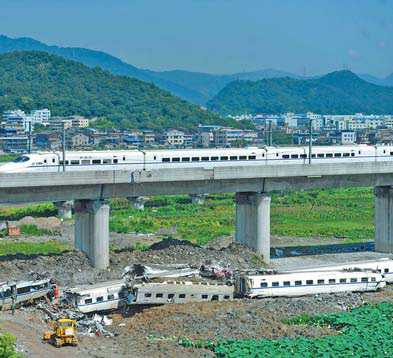Society
Public wary of high-speed railway - Survey
Updated: 2011-07-26 07:17
By Wang Zhenghua (China Daily)
WENZHOU, Zhejiang - Although a spokesman for the Ministry of Railways said on Sunday that China's high-speed rail technologies are advanced, passengers have not regained confidence in the service after Saturday's deadly accident in Zhejiang province.
 |
|
A bullet train passes the accident site in Wenzhou, Zhejiang province, on Monday. The high-speed railway line resumed operations only two days after a train crash that killed at least 39 people. The cause of the accident is still unclear. Ma Qibing / for China Daily |
Despite widespread doubts and criticism, Railways Ministry spokesman Wang Yongping told a news conference on Sunday night that China's high-speed rail technology is advanced and up to standard.
"We still have confidence in it," he said.
But his reassurance seemed to have little effect on the public's shattered confidence.
Members of the public have raised concerns about the safety of the 200-250 km/h trains which were involved in the accident.
Concerns were also raised about the high-speed trains developed solely by China, which can travel at a super fast 300 km/h. The Beijing-Shanghai high-speed rail line, which opened this month, has already experienced several power cuts, which left passengers stranded on trains for hours.
On Monday morning, traffic resumed on the wrecked rail section near Shuangyu town in Wenzhou, Zhejiang. More than 60 trains passed through the section, with 11 services still suspended.
Most windows at the ticketing office of Wenzhou South Railway Station remained closed on Monday, in contrast to the bustling scenes on normal days.
There was a long line of passengers, but they were waiting for refunds for tickets on trains canceled or delayed due to the accident.
On Monday, some passengers still boarded bullet trains from Wenzhou, saying they had no choice.
Trains are the most common mode of transport in China for trips between cities. In the seven-day Spring Festival holiday alone, more than 2.3 billion trips are made on all kinds of trains.
"It's unrealistic to give up the high-speed train service because of a single deadly accident," said Zhang Liang, who traveled with a friend to Zhenjiang in neighboring Jiangsu province on Monday.
"Bullet trains are fast and comfortable, but their safety and service need to be improved."
According to an online survey by ifeng.com, more than 54 percent of 251,000 people polled said they would not take high-speed trains, at least in the short term. Only 15 percent said they believed the service was safe.
Those who have no choice but to travel by fast trains said they will pay special attention to safety facilities on the trains.
"I will look out for the emergency exits and the safety hammer when I get on the train," Lei Fulong, who was about to travel on a bullet train to Fuding, East China's Fujian province, on Monday.
"It's absurd that a train does not have a system to handle lightning strikes," he said. "Safety belts are also necessary in a vehicle running at 250 km/h."
The authorities had expected the line near Wenzhou, in Zhejiang province, to resume service before 6 pm on Sunday, but it was interrupted by Sunday night's rainstorm and frequent lighting strikes. Saturday's tragedy was allegedly caused by one strike stopping a train, which was later hit by another high-speed train.
More than 50 percent of respondents in the online poll said the site of the accident was cleared too quickly, which could make it difficult to properly investigate the cause of the accident.
A 2-year-old girl was found alive in the wreckage hours after the rescuers had been told to stop searching for survivors and to begin cutting apart the wrecked carriages.
Without commenting on whether there was anything wrong with the rescue operation, spokesman Wang called the survival of the girl "a miracle".
"It just happened, and that's it," he said.

Specials

Turning up the heat
Traditional Chinese medicine using moxa, or mugwort herb, is once again becoming fashionable

Ciao, Yao
Yao Ming announced his retirement from basketball, staging an emotional end to a glorious career.

Financial sector short of talent
Lack of skilled professionals in Shanghai inhibiting the city's development as a financial hub